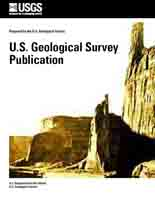Time-series photographs of the sea floor in western Massachusetts Bay, 1996 - 2005
Links
- More information: Publisher Index Page (html)
- NGMDB Index Page: National Geologic Map Database Index Page (html)
- Download citation as: RIS | Dublin Core
Abstract
Time-series photographs of the sea floor were obtained from an instrumented tripod deployed in western Massachusetts Bay at LT-A (42° 22.6' N, 70° 47.0' W; 32 m water depth; fig. 1) from December 1989 through September 2005. The photographs provide time-series observations of physical changes of the sea floor, near-bottom water turbidity, and life on the sea floor. Two reports present these photographs in digital form (table 1) and chronological order. U.S. Geological Survey Data Series 265 (Butman and others, 2008a) contains the photographs obtained from December 1989 to October 1996. This report, U.S. Geological Survey Data Series 266 (Butman and others, 2008b), contains photographs obtained from October 1996 through September 2005. The photographs are published in separate reports because the data files are too large for distribution on a single DVD. This report also contains photographs that were published previously in an uncompressed format (Butman and others 2004a, b, and c; table 1); they have been compressed and included in this publication so that all of the photographs are available in the same format. The photographs, obtained every 4 or every 6 hours, are presented as individual photographs (in .png format, each accessible through a page of thumbnails) and as a movie (in .avi format).
The time-series photographs taken at LT-A were collected as part of a U.S. Geological Survey (USGS) study to understand the transport and fate of sediments and associated contaminants in Massachusetts Bay and Cape Cod Bay (Bothner and Butman, 2007). This long-term study was carried out by the USGS in partnership with the Massachusetts Water Resources Authority (MWRA) (https://www.mwra.state.ma.us/) and with logistical support from the U.S. Coast Guard (USCG). Long-term oceanographic observations help to identify the processes causing bottom sediment resuspension and transport and provide data for developing and testing numerical models. The observations document seasonal and interannual changes in currents, hydrography, suspended-matter concentration, and the importance of infrequent catastrophic events, such as major storms, in sediment resuspension and transport. LT-A is approximately 1 km south of the ocean outfall that began discharging treated sewage effluent from the Boston metropolitan area into Massachusetts Bay in September 2000. See Butman and others (2004d) and Butman and others (2007a) for a description of the oceanographic measurements at LT-A. See Butman and others (2007c) and Warner and others (2008) for discussion of sediment transport in Massachusetts Bay.
Suggested Citation
Butman, B., Dalyander, P., Bothner, M., Lange, W.N., 2008, Time-series photographs of the sea floor in western Massachusetts Bay, 1996 - 2005 (Version 1.0): U.S. Geological Survey Data Series 266, HTML Dcoument, https://doi.org/10.3133/ds266.
ISSN: 2327-638X (online)
ISSN: 2327-0271 (print)
Study Area
| Publication type | Report |
|---|---|
| Publication Subtype | USGS Numbered Series |
| Title | Time-series photographs of the sea floor in western Massachusetts Bay, 1996 - 2005 |
| Series title | Data Series |
| Series number | 266 |
| DOI | 10.3133/ds266 |
| Edition | Version 1.0 |
| Year Published | 2008 |
| Language | English |
| Publisher | U.S. Geological Survey |
| Contributing office(s) | Woods Hole Science Center |
| Description | HTML Dcoument |
| Time Range Start | 1996-01-01 |
| Time Range End | 2005-12-31 |
| Country | United States |
| Other Geospatial | Massachusetts Bay |
| Online Only (Y/N) | N |
| Additional Online Files (Y/N) | Y |


